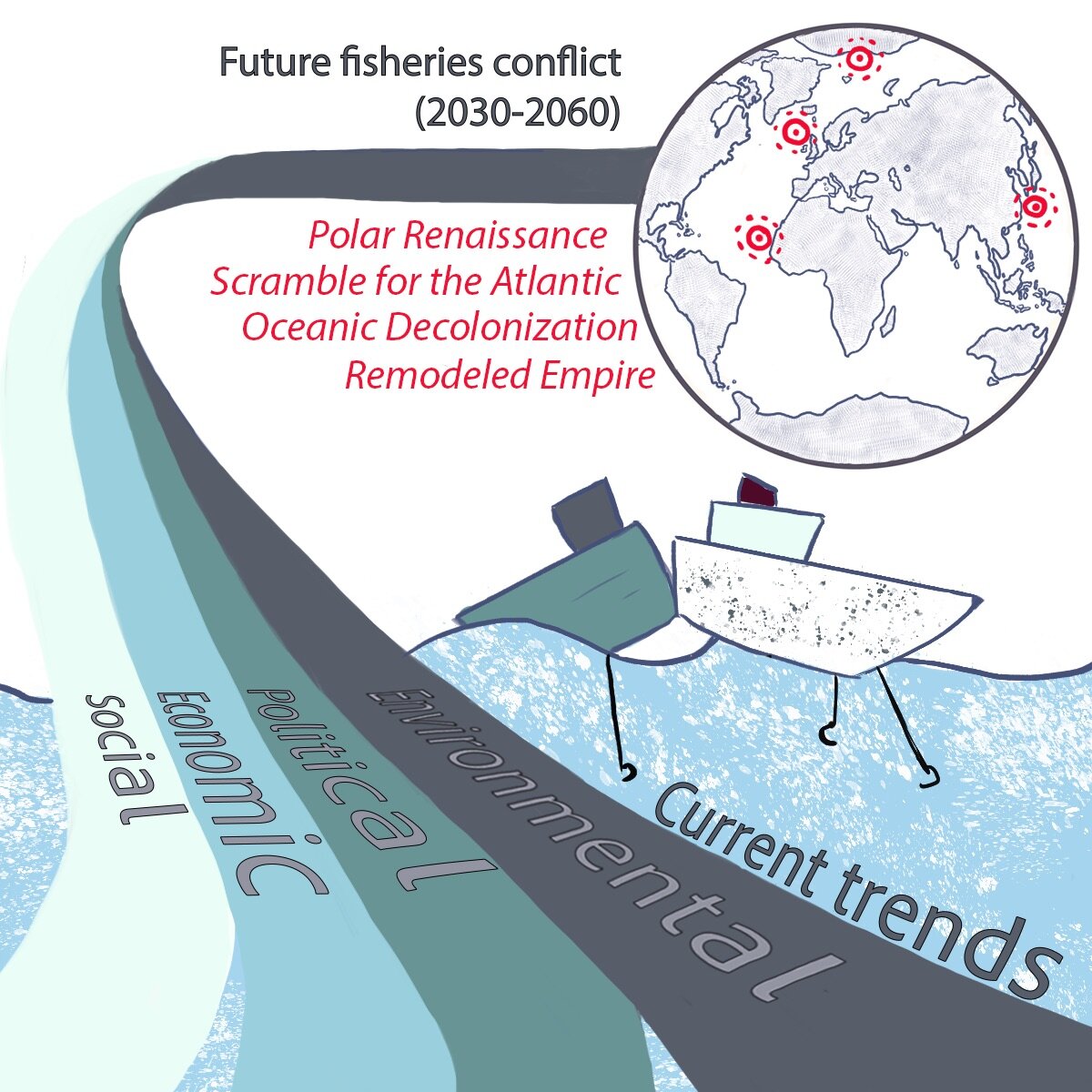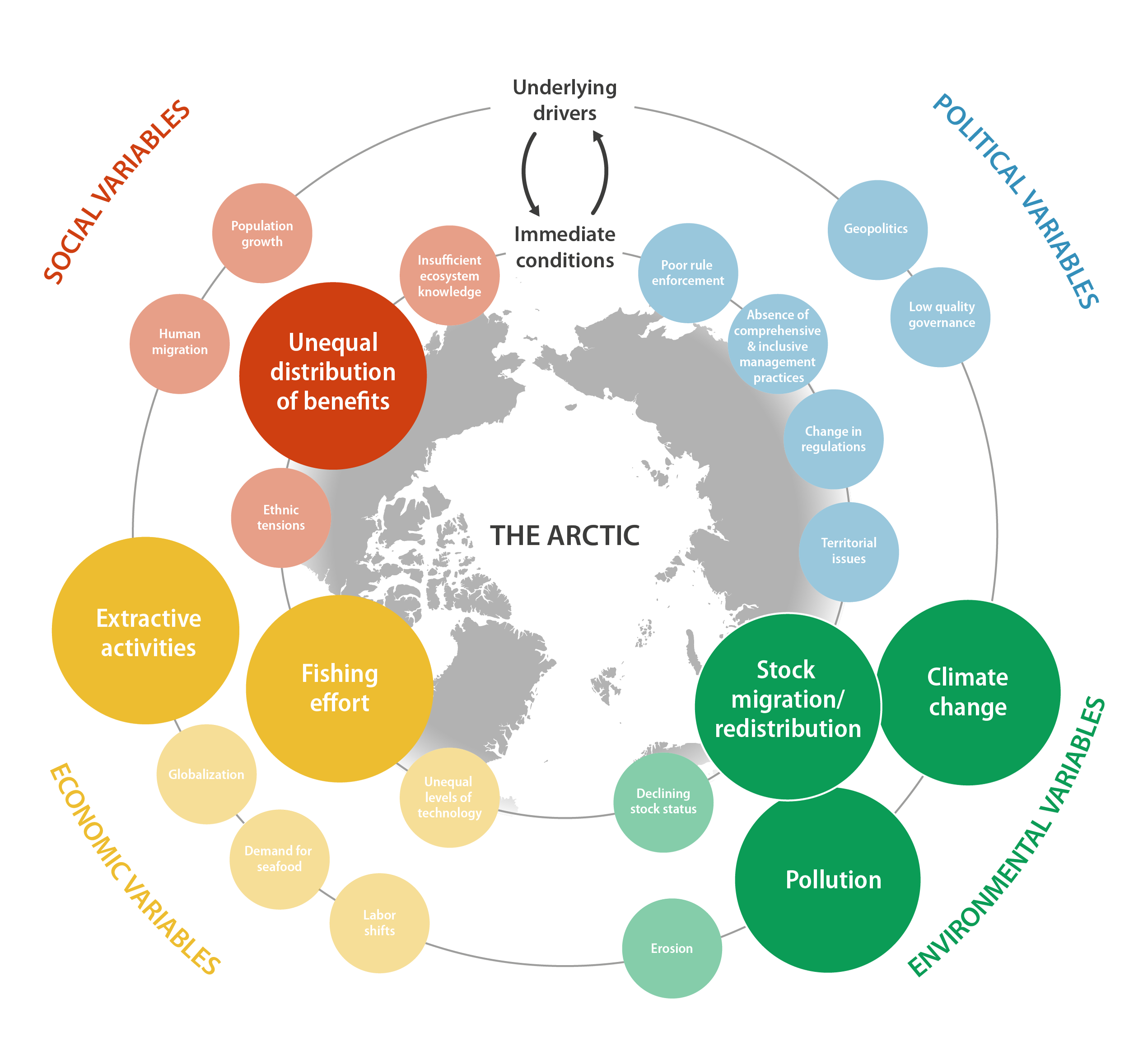Exploring the future of fisheries conflict through narrative scenarios
SCientific summary
Disruptive changes in our global ocean and fisheries have sparked warnings of an increase in fisheries conflicts. However, such environmental changes have not yet been considered in tandem with other critical social, economic and political trends to map out possible future trajectories for fisheries conflict. By use of an exploratory scenario approach, we escape deterministic forecasts of future conflict and instead provide creative and complex narratives set in four regions of the world: the North-East Atlantic, East China Sea, the coast of West Africa and the Arctic. We highlight key lessons learnt from the four scenarios, and the narrative approach taken to build them, for both scientists and policymakers. The scenarios are designed to trigger questions around the consequences of our current choices and how to avoid undesirable trajectories. They can be used to support decision making in the present by building capacity for better anticipation of an unpredictable future
Highlights
Fisheries conflicts are projected to increase due to changes in our ocean.
We consider how multiple causal factors can drive conflict using a scenario approach.
We construct four scenarios in conflict-prone regions of the world.
Questions sparked by the scenarios can help build anticipatory governance capacity.
summarizing the approach
By systematically combining scientific evidence with creative story-telling techniques, we map out the different causal drivers of fisheries conflicts, and explore how they interact in four regional settings by developing four narrative scenarios. We advance the narrative scenario approach by combining diverse data sources to craft primary storylines, and by consulting regional experts to validate the scenarios and develop alternative future trajectories. The development of the scenarios, and the questions that arise from them, are of critical significance to policymakers seeking to build proactive and anticipatory governance capacity, rather than merely reacting to the seemingly constant series of unfolding and unanticipated crises.
THE four fishery conflict scenarios
The four scenarios are: Scramble for the Atlantic, Oceanic Decolonization, Remodeled Empire and Polar Renaissance. The figures below are graphical illustrations of the particular social, political, economic and environmental drivers and conditions that are amplified in each of the respective scenarios.
Alternative scenario pathway(s)
Drawing on regional experts, for each of the scenarios, we asked selected experts from each scenario region and from diverse dsiciplinary backgrounds to review each narrative scenario and share reflections on particular inflection points, decisive factors, or branches that could have led the scenario to go a different way. A key part of this work is exploring the potential future of fisheries conflict through creating narrative simulations that can be useful for adaptive governance and futures focused policy making. Therefore, under each of the narrative scenarios, you will find a short section reflecting on some ways the scenario could have gone differently.
Project Lead
Jessica Spijkers is a postdoc working for the CSIRO Oceans and Atmosphere unit. Her research is focused on understanding the capacity of nations’ fisheries governance systems to address overfishing and illegal, unreported and unregulated fishing. Jessica has an interdisciplinary background. She recently completed her cotutelle PhD at the Stockholm Resilience Center (Stockholm University) and the ARC Centre for Coral Reef Studies (James Cook University), exploring the global patterns of international fisheries conflict. Prior to this she did her MSc in the Social-ecological Resilience for Sustainable Development at the Stockholm Resilience Centre.
The authorship team
The diverse authorship team includes experts in environmental governance, peace and conflict studies, ecology, fisheries, social-ecological systems, sustainable development, human geography, law and political science, sustainable futures, environmental conflict and security, and - climate change and security. The full author team is: Andrew Merrie, Colette C. C. Wabnitz, Matthew Osborne, Malin Mobjörk, Örjan Bodin, Elizabeth R. Selig, Philippe Le Billon, Cullen Hendrix, Gerald Singh, Patrick W. Keys, and Tiffany H. Morrison.
full paper
To read the full radical conflict futures paper, please head over to OneEarth by following this link.
meet our designer - coralie legrand
The introductory video, animated scenario illustrations and the static images are all the work of the talented freelance graphic & motion designer, Coralie Legrand based in Brussels, Belgium. She focusses on graphic communication, illustration and visual storytelling through motion with a special interest in science and sustainability. Her mind is a curious beast, obsessing over colours and basic shapes. She loves to work on projects that aim to make the world a better place and spread kindness where she can.
Please check out her website and consider her for your next project.







![CoralieLegrand[1].jpg](https://images.squarespace-cdn.com/content/v1/58022ca06b8f5bc8f4786ce2/1614951058377-VOYJ6O8MZ11G47OQ7O40/CoralieLegrand%5B1%5D.jpg)